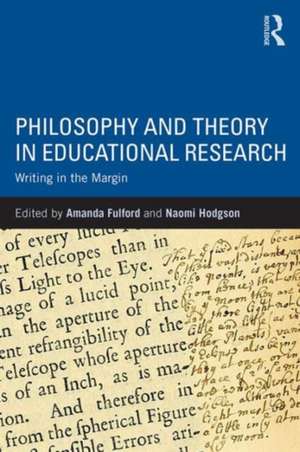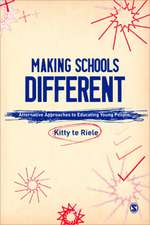Philosophy and Theory in Educational Research: Writing in the margin
Editat de Amanda Fulford, Naomi Hodgsonen Limba Engleză Paperback – 13 iun 2016
- The volume focuses on the practices of reading and writing that are central to research in educational philosophy, suggesting that these practices constitute the research, rather than simply reporting it.
- It is not a prescriptive guide and should not be read procedurally. Rather, it is intended to illustrate the possibilities for this kind of research, and to suggest starting points for those pursuing research projects.
- Finally, attention is given to the ways in which conducting educational philosophy can be educative in itself, both to the researcher in writing it, and to its audience in reading it.
| Toate formatele și edițiile | Preț | Express |
|---|---|---|
| Paperback (1) | 383.58 lei 6-8 săpt. | |
| Taylor & Francis – 13 iun 2016 | 383.58 lei 6-8 săpt. | |
| Hardback (1) | 763.78 lei 6-8 săpt. | |
| Taylor & Francis – 15 iun 2016 | 763.78 lei 6-8 săpt. |
Preț: 383.58 lei
Nou
Puncte Express: 575
Preț estimativ în valută:
73.40€ • 75.72$ • 61.25£
73.40€ • 75.72$ • 61.25£
Carte tipărită la comandă
Livrare economică 26 martie-09 aprilie
Preluare comenzi: 021 569.72.76
Specificații
ISBN-13: 9781138899186
ISBN-10: 1138899186
Pagini: 204
Dimensiuni: 156 x 234 x 18 mm
Greutate: 0.32 kg
Ediția:1
Editura: Taylor & Francis
Colecția Routledge
Locul publicării:Oxford, United Kingdom
ISBN-10: 1138899186
Pagini: 204
Dimensiuni: 156 x 234 x 18 mm
Greutate: 0.32 kg
Ediția:1
Editura: Taylor & Francis
Colecția Routledge
Locul publicării:Oxford, United Kingdom
Cuprins
Part I:
Illustrates the multiple ways in which non-empirical research can be undertaken in education, as outlined in Part I. It will do this by presenting a number of examples of ongoing research by international scholars and practitioners in the field, each addressing a different substantive area of policy or practice, and each illustrating a different mode of analysis.
Part III
This final part of the text is a critical reflection on Part II. It has three broad aims:
- Research, Researching and the Researched
- Research at the Crossroads
- Educational Inquiry and Philosophy of Education
Illustrates the multiple ways in which non-empirical research can be undertaken in education, as outlined in Part I. It will do this by presenting a number of examples of ongoing research by international scholars and practitioners in the field, each addressing a different substantive area of policy or practice, and each illustrating a different mode of analysis.
Part III
This final part of the text is a critical reflection on Part II. It has three broad aims:
- To show how theoretical/philosophical writing is concerned with policy and practice. This will be demonstrated with reference to the contributions from Part II and by analysing to what extent these might be arranged/classified to make more explicit the nature of any difference, and how such thinking might be productive for thinking about education;
- To say that theoretical/philosophical research cannot be separated from the practice (and the practise) of philosophical reading and writing;
- To show that the practices of reading and writing that we illustrate are ones that position the researcher and the researched in a particular way: they open up a starting point for new ways of thinking both about the self and about education.
Notă biografică
Amanda Fulford is Head of Postgraduate Programmes in the Institute of Childhood and Education and Associate Principal Lecturer in Education Research at Leeds Trinity University, UK.
Naomi Hodgson is Visiting Research Fellow in the Laboratory for Education and Society, KU Leuven, Belgium, and Visiting Lecturer at Liverpool Hope University, UK.
Naomi Hodgson is Visiting Research Fellow in the Laboratory for Education and Society, KU Leuven, Belgium, and Visiting Lecturer at Liverpool Hope University, UK.
Descriere
Writing in the Margin explores the practise of reading and writing in philosophy of education and education theory, addressing what is means to do research and evaluating to what extent the empirical and non-empirical distinction is helpful in educational research. Drawing on their own research, theoretical and philosophical sources, the authors investigate the important issue of what it means to read and write when there is no prescribed structure. With contributions from international scholars in the field of philosophy of education, this book is globally applicable and will be a valuable guide for postgraduate students and academics who are reading or writing in the field of education.









